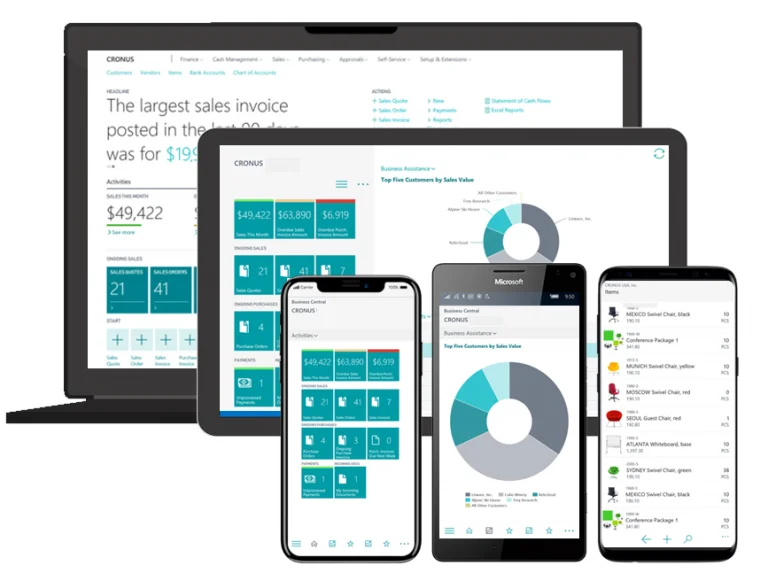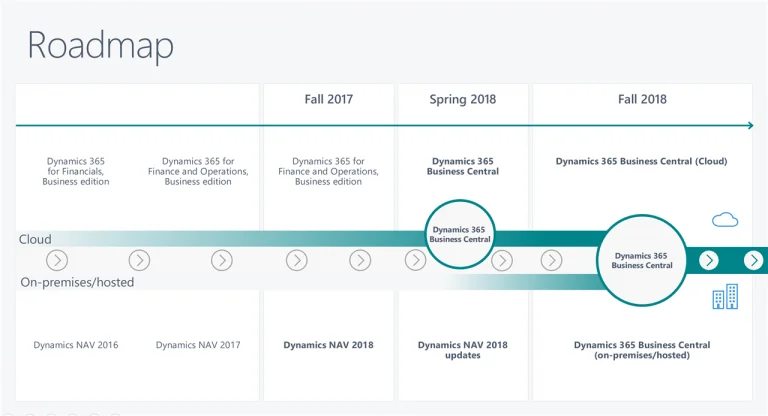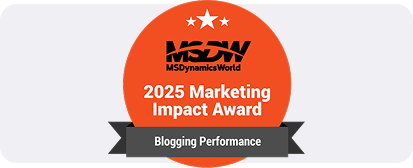Business Central vs Dynamics NAV: How Different Are They?
Microsoft Dynamics 365 Business Central is a major upgrade from the Dynamics NAV platform, offering its users a comprehensive business management solution with enhanced features, core business functionalities, and increased operating flexibility.
Dynamics NAV, a software package developed by Microsoft, has undergone a significant transformation to become Dynamics 365 Business Central.

With thousands+ of installations worldwide, Microsoft has invested over a billion dollars annually in research and development to win more customers, now ready for the security and availability of cloud applications like Dynamics NAV (now Business Central) and other CRM (customer relationships management) and ERP solutions in the suite of business management applications – Microsoft Dynamics 365.
Forgive me, I got a bit swayed away. My job here is to let you know the big differences between two versions of the almost same solution – Dynamics NAV or Business Central. Or shall I say - are they different?
So, let's see - how different are they, in terms of their features, core business management functionalities, add-ons, and third-party software integrations, and the benefits of choosing Business Central instead of continuing with Dynamics NAV?
Dynamics NAV vs. Dynamics 365 Business Central: What’s the key difference?
One of the key differences between Dynamics NAV and Business Central is the deployment roadmap, as described in the following flowchart:

While Dynamics NAV was designed to be only available for on-premises deployment, MSFT D365 Business Central offers you full flexibility to deploy it either in the cloud, on-premises, or as a hybrid ERP (enterprise resource planning) solution.
This means if you are out for flexible and highly adaptable ERP software, you can choose the desired deployment approach with Business Central and that too within the budget.
For instance, if you opt for the cloud option, you get greater accessibility and scalability, and if you go with the on-premises solution, you have more control over data and infrastructure.
Note: Going with the on-premises solution does not translate into you having poor data security than the cloud option. Microsoft Cloud is built on the Azure framework and is second to none in the market.
Dynamics NAV vs Dynamics 365 Business Central: Comparing Core Features
In terms of features, Business Central has all the rich functionality of Dynamics NAV, but with the added benefits of cloud-based technology, which is not readily available with Dynamics NAV except for its 2018 version.
Choosing Business Central instead of continuing with Dynamics NAV offers a range of benefits to businesses like yours and use its powerful features for:
- Real-time insights
- Integrated workflows,
- Powerful reporting capabilities, and more all within a single platform.
With Business Central, users can manage functions that power their entire business, from financial and supply chain management to customer service and sales.
One of the core business management functionalities of Business Central is its accounting and financial management capabilities.
Dynamics 365 Business Central is a cloud-powered ERP platform and provides a comprehensive set of tools for your finance management, including:
- Accounts payable and receivable
- General ledger
- Cash management
- Budgeting
These features allow businesses to have a clear and correct picture of their financial situation and help make informed decisions based on real-time data.
Add-ons and Third-Party Integrations: Dynamics NAV vs Dynamics 365 Business Central
In comparison to Dynamics NAV, D365 Business Central offers a wide range of powerful add-ons like WMS Mobile from Tasklet Factory to optimize your warehouse and operations, and third-party software integrations, including those for manufacturing, project management, and human resources.
For instance,
- Shopify Connector - to synchronize orders, stock, and customer information.
- Continia OPplus - an automated application that allows for enhanced payment import and export.
- Continia Document Capture - a business central add-on that reduces your manual tasks, helps you avoid errors & save time by automating your entire Accounts Payable
- Master Data Information - This add-on assists you in simply creating custom fields and doing master data management and PIM without customization.
- B2B eCommerce Webshop & PIM in One - Launch a B2B ecommerce webshop in no time. Control PIM information and online sales from Business Central.
To find your fit, go to Microsoft AppSource using this link: Add-Ons for Dynamics 365 Business Central
These add-ons and integrations to Microsoft Business Central help you to effectively streamline your operations, automate repetitive tasks, and access real-time data from multiple sources.
My NAV is working Fine, Why Should I move to Dynamics 365 Business Central?
Well! That is equivalent to saying, I’m happy with whatever or wherever I’m. But what if you go to places and make your dreams and fantasies come true?
“Similarly, what if your business has the potential to make more profit than you can ever imagine – just by moving to the cloud at affordable costs?”
So, if the answer is yes, you can go with the cloud-based deployment options. This also helps you reduce your IT infrastructure costs, increase scalability and accessibility, and have access to real-time data from anywhere, anytime.
Dynamics 365 Business Central offers a range of built-in security features when compared to NAV, ensuring that your sensitive data is always protected and safe.
The new Business Central offers several key functionalities that improve upon its predecessor, Dynamics NAV.
Dynamics 365 Business Central offers tight integration with other Microsoft applications, a complete view of your business using real-time data and business analytics, and easy upgrades with a bi-annual release cadence.
Furthermore, this all-in-one ERP allows the creation and automation of workflows with Microsoft Flow (now known as Microsoft Power Automate) and seamless data sharing with Dynamics 365 for Sales, Microsoft's CRM platform.
And if the answer is no, or you want a different Microsoft Partner that listens to your problems and provides you with a viable solution, consider contacting a leading Microsoft Dynamics 365 Partner in Canada like Dynamics Square.
How is the Licensing and Pricing for Dynamics 365 Business Central?
1. Licensing of Dynamics 365 Business Central
The licensing options of Business Central have also evolved from its predecessor, with the choice to license the software as either a monthly subscription or perpetual.
Moreover, you can deploy Business Central in the cloud or on-premises, providing you the greater flexibility at reduced costs.
Existing Microsoft Dynamics NAV customers may be uncertain about whether to upgrade to Business Central.
In that case, Microsoft is committed to helping these customers make the transition as seamless as possible, with time-sensitive discount pricing of up to 40% to 45% off for Dynamics customers who have been running any solution from the Dynamics ERP family before October 1, 2018. You can contact Microsoft Dynamics Partners like Dynamics Square to get started.
Remember, Businesses currently using Dynamics NAV should be aware that no new versions have been released since December 31, 2018, and sales of NAV 2018 stopped on April 1st, 2019. As of June 30, 2021, new and existing customers must pay the full price for Microsoft Dynamics Business Central licenses.
2. Pricing for Dynamics 365 Business Central
Here is a detailed pricing model for Dynamics 365 Business Central but keep it in mind, pricing for Dynamics 365 Business Central varies depending on the licensing model and the number of users.
So, it's best to contact a Microsoft representative or a certified cloud solution partner (CSP) like us for more specific pricing information tailored to your business needs.
Dynamics 365 Business Central is available in two different licensing models: Essential and Premium.
The Essential licensing model includes core financial management, supply chain management, project management, and customer relationship management (CRM) functionality.
The Premium licensing model includes everything in the Essential licensing model, plus additional features for manufacturing and service management.
Both licensing models offer a choice between two deployment options: cloud or on-premises.
Again, Note: “The on-premises deployment option is based on a perpetual licence model, whereas the cloud deployment option is based on a per-user per-month subscription model.”
Here are the complete details of the pricing for each licensing model and deployment option:
Cloud Deployment:
Essential: Starting at $89.60 (CAD) per user/month
Premium: Starting at $128 (CAD) per user/month
On-Premises Deployment:
Essential: Starting at 11208.08 (CAD) for a perpetual license for one concurrent user
Premium: Starting at 21348.72 (CAD) for a perpetual license for one concurrent user
There are added fees for both deployment options for more users, support, and other modules.
Microsoft and its Silver and Dynamics 365 Partner like Dynamics Square also offer a range of service plans that provide you with extra support, training, and consulting services.
Caution: Pricing is always subject to change, so it's always recommended to ask/talk to your Microsoft Dynamics Partner or refer to the official Microsoft website for the latest pricing information.
“If you want to upgrade to Business Central, get advice, or speak with a Dynamics Square executive, do so now. Get in touch to avail yourself of a cloud/on-premises, flexible, and suitable ERP solution for your small/medium size business.”
Why should Small Businesses move from Dynamics NAV to Dynamics 365 Business Central?
Certainly! Let me answer this serious question - with the advent of time, as businesses evolve and grow, their needs change like we humans.
With the release of Dynamics 365 Business Central, Microsoft is offering a comprehensive solution that combines the features and functionalities of Dynamics NAV with the power of its most secure cloud technology - Microsoft Cloud.
There are several reasons why businesses should consider moving from Dynamics NAV to Dynamics 365 Business Central:
Increased Flexibility and Scalability: Dynamics 365 Business Central provides flexible and scalable solutions that enable businesses to easily adapt to changing market demands and take advantage of new features and functionalities through the power of the cloud.
Enhanced Security: D365 Business Central provides enhanced security features with built-in security and compliance, ensuring the safety and security of business data against cyber threats and data breaches.
Improved Integration: Microsoft’s Business Central gets integrated seamlessly with other Microsoft applications, such as Office 365 and Power BI for enhanced business intelligence for your teams, making it easier for businesses to collaborate and share data across departments.
Streamlined Processes: Business Central ERP helps you automate tasks and provide you with real-time insights into business operations, streamlining processes, reducing the time and effort needed to manage day-to-day operations, and freeing up time for more strategic initiatives.
Reduced Costs: By moving to Dynamics 365 Business Central, businesses can reduce IT infrastructure costs and reduce the need for hardware maintenance and upgrades. With a predictable monthly subscription fee, businesses can better manage their budgets and minimize the total cost of ownership.
Summary!
Business Central offers small and medium-sized enterprises like yours a comprehensive business management solution with enhanced features, core business functionalities, add-ons, third-party software integrations, and increased flexibility.
With this cloud software, you can seamlessly streamline your operations, access real-time data, and make informed decisions. Businesses can future-proof their operations and position themselves as resilient leaders of growth and success in today's evolving business space.
The same seems harder to achieve if you continue using Dynamics NAV!



